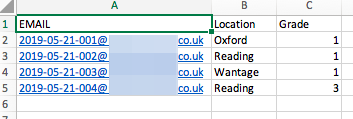What does good practice look like? We’ve put together a few ideas that you may want to consider if you are a WorkInConfidence conversation recipient.
Build rapport and trust:
For some individuals, it can take an enormous amount of courage to take the first step in starting a conversation, so building rapport and trust quickly is key. Here’s some ways we’ve found helpful:
Respond as soon as practically possible to confirm that you have received the message by sending a “holding” response. This lets the sender know that their message has reached the intended recipient and that they have successfully raised the matter. For example, “Thank you for taking the time to raise this matter with me. I will look into this in more detail and come back to you with a response by <date>.“
Explain what is going to happen next, even if this is just to seek advice from a colleague and, again, give a timescale for when you expect to be in a position to come back with an up-date.
Re-iterate it is their option to remain anonymous and also how much you appreciate them taking the time to start the conversation.
Commit to keeping them updated (even if it is “no progress yet”!).
Ensure the individual feels their concern has been “heard”:
When we have “in person” conversations we have a wide range of techniques at our disposal for letting a colleague know that we have understood what they have to say, sometimes this can be with just a nod of the head!
Achieving this through an online dialogue may mean you wish to adopt a few changes in the way you respond, especially say compared to a regular email exchange. Don’t be afraid to ask clarifying questions to ensure that you have a full understanding of the subject being raised and to tease out whether the matter is valid (for example, an individual may perceive they are being bullied when in fact they are being asked to fulfil the requirements of their job).
Here’s a few other suggestions:
Acknowledge their experience. Example “Thank you for your message and for raising this matter which I appreciate has been a source of x y or z for you.”
Consider your choice of language, focussing on adopting an empathetic tone.
Ask if they are looking for advice or what course of action they are expecting as a result of raising the matter.
Recognise the boundaries of your own expertise/competence:
As much as most of us have a desire to step up and help others; being able to recognise when a matter may be outside of your area of expertise can be crucial. If you find yourself in this situation, here’s some actions you may want to consider:
Convey to the person raising the item, as early as possible, that you wish to refer their matter to a colleague who is more appropriately placed to help with a resolution.
Commit to still being “there” should they feel that the concern does not get resolved satisfactorily and remind them that they always have the option to start a new conversation.
Encourage them to continue to use the platform to engage with yourself and colleagues in the future.
Maintain ownership of the relationship:
The importance of retaining accountability when handling a conversation helps to build trust in the psychological contract and provide the individual with reassurance and confidence.
Let them know that you are committed to seeing the matter through until you are sure it is either resolved (or that a transfer to another colleague has been successfully completed).
Diarise reminders to yourself to keep on top of progress, where escalation has been required.
If the matter needs raising raise through a formal procedure, provide the opportunity to keep the conversation open and commit to regular check ins to make sure there is progress.

Taking a proactive, accountable approach that recognises your own areas of competence is a great way of generating authentic communication with your colleagues. These are just a few ideas and we are always open to suggestions, so please do start a conversation with us by sending an Email to support@workinconfidence.com!
Need more help? If you'd like help or support on any feature of WorkInConfidence then please get in touch by either creating a new support ticket, sending an email to support@workinconfidence.com or using the chat function in the bottom right of the page.






